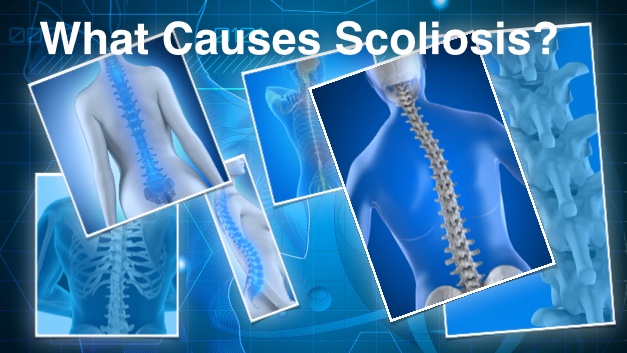Scoliosis Causes
While scoliosis is often viewed as a disease unto itself, the reality is that it’s not. Rather scoliosis is a multifactorial condition that can occur as a consequence of other issues.
While some scoliosis causes are easy to recognize, such as a congenital anomaly such as a wedged vertebra, others such as neurogenic causes are more complex. Yet the vast majority (80% of all cases of scoliosis are still classified as “idiopathic” meaning that the cause is unknown.
While there are exact causation may not yet be fully understood there is still a lot that is known about how a scoliosis starts. Research on scoliosis done by Drs. Collard and Richard allowed them to develop a hypothesis on how scoliosis begins.
Genetic Component
There is a genetic marker test that can give a clinician an idea if there are genetic markers that predispose a child’s scoliosis to progress, but the information gleaned from the test is of limited value.
Finding what may be driving scoliosis causes is important when it comes to finding the right treatment. While genetics plays a role in the likelihood of the progression of scoliosis there are other factors that can determine if a scoliosis will worsen. Find out what they are in this article on Epigenetics of scoliosis.
Early Detection of Scoliosis
Accurately evaluating the degree, severity and complicating factors involved in your scoliosis will determine which treatment is right for you. Discover some of the latest and most technologically advanced tools for evaluating scoliosis.
Minimizing Need for Scoliosis X-rays
Rasterstereography (aka Formetric) is a non x-ray form of imaging the spine that can be used to effectively monitor scoliosis to minimize x-ray exposure. Using this cutting edge technology can allow us to reduce the x-ray exposure to our patients by over 75% over the course of their treatment program.
Find out more about this advanced technology that has been used in many scoliosis centers in Europe and is available to patients in our offices.
Scoliosis Pain
Scoliosis Symptoms are often found with adults, yet the severity of the curvature does not necessarily correlate with the level of pain. Find out why.
Adults with scoliosis pain are often told by their doctors that there is nothing that can be done for their scoliosis pain, other than take medications. Find out about the treatments your doctor isn’t telling you about and see if they could help relieve you scoliosis pain.
Scoliosis Treatment
Review of Current Alternatives in Scoliosis Treatment – Examines and compares all types of scoliosis treatment in this FREE e-book. Find the treatment that is best for you based on your scoliosis causes.

